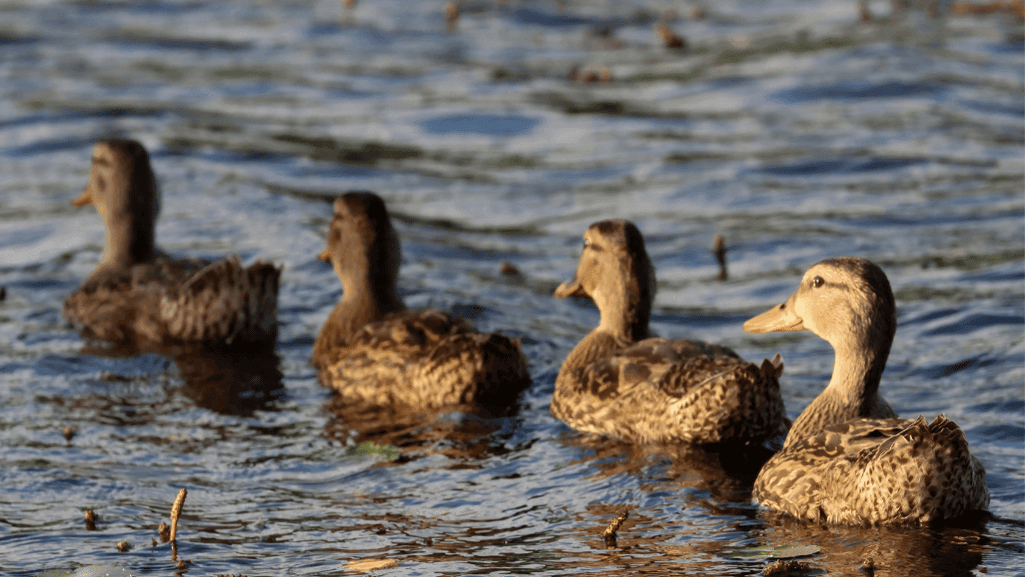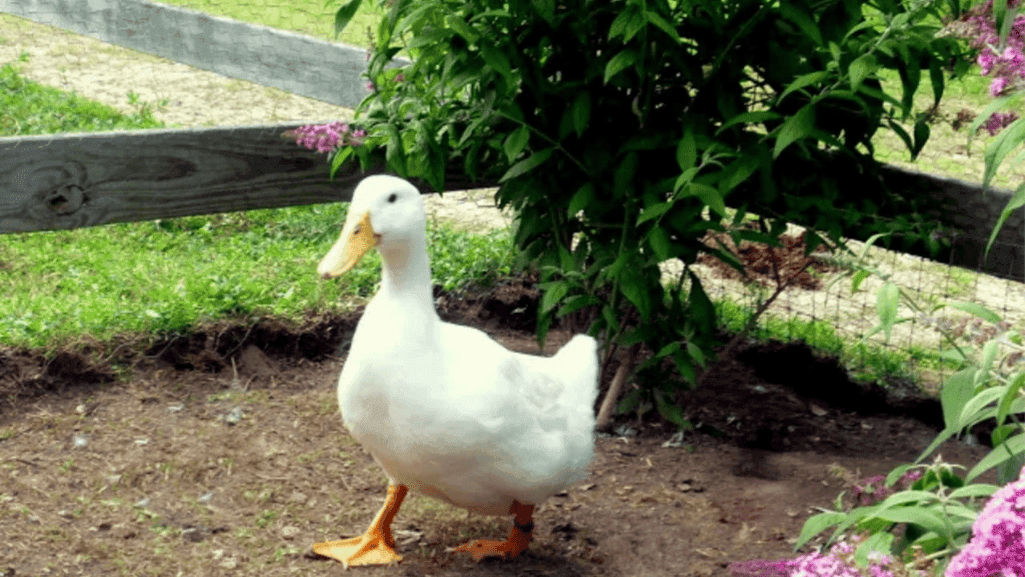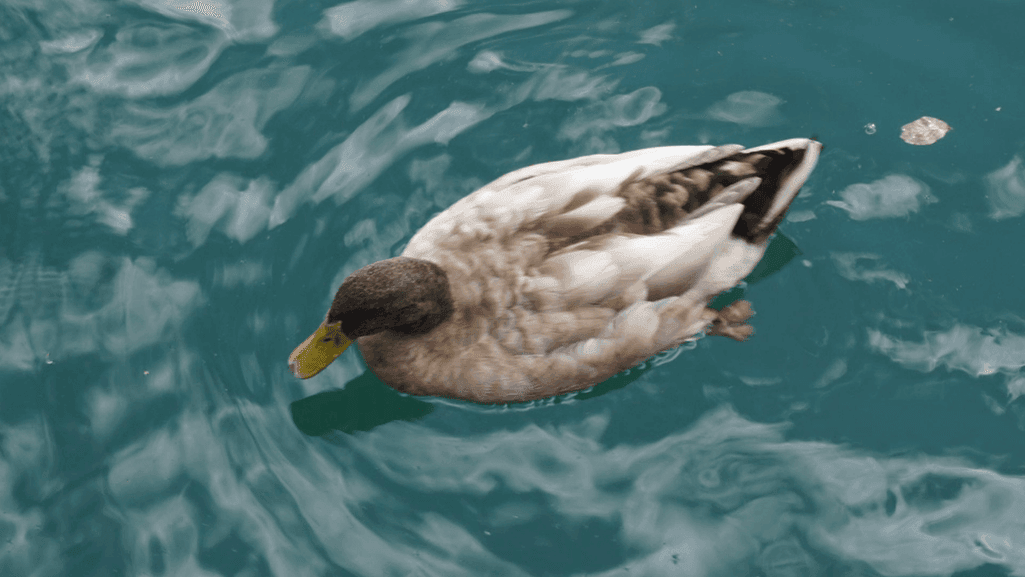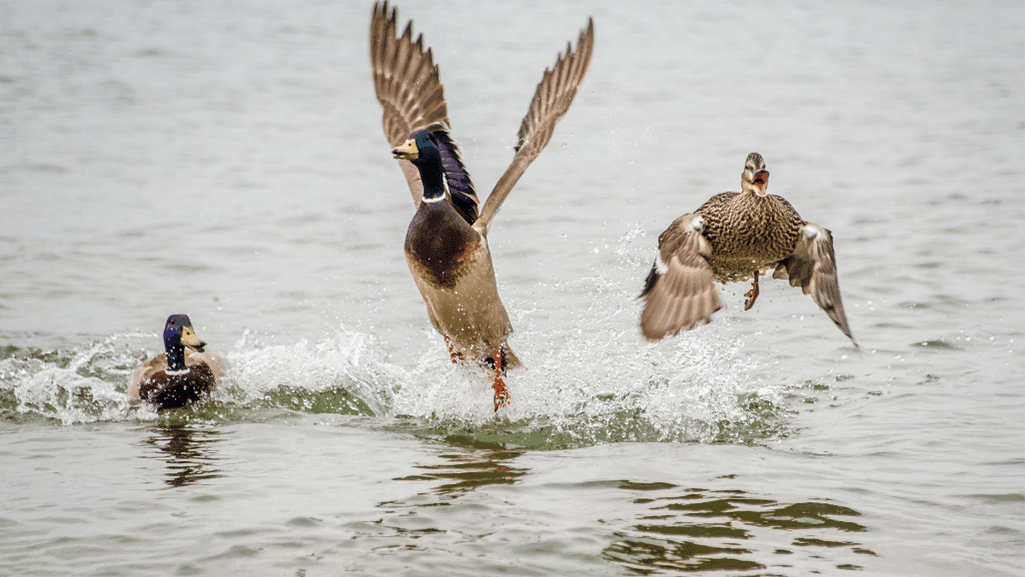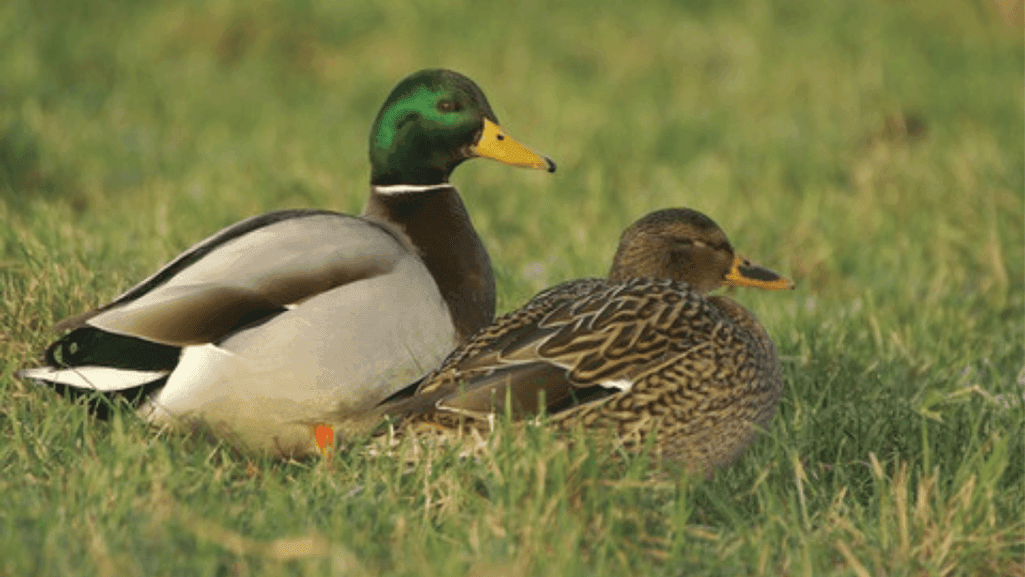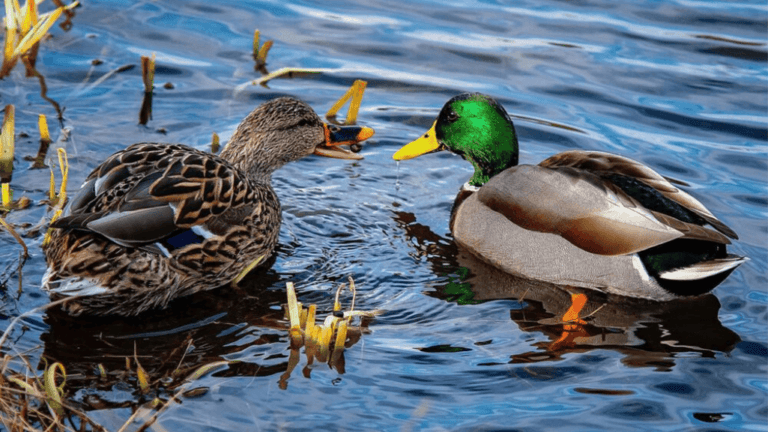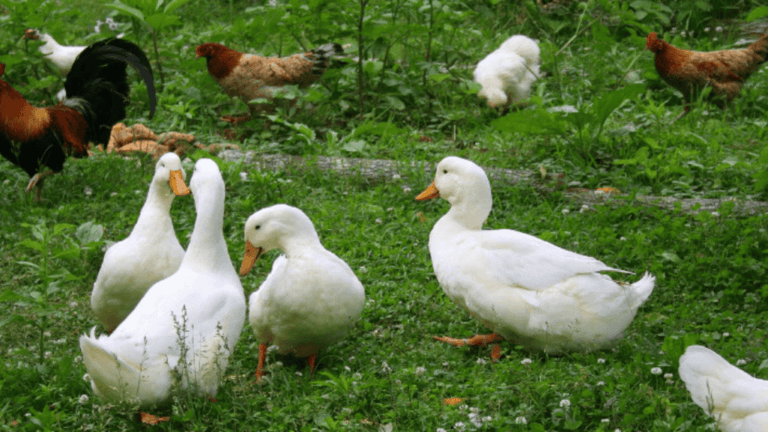Ducks can be a nuisance when they invade yards and properties, leaving behind droppings and creating a mess. These waterfowl are naturally attracted to swimming pools, ponds, and other water sources. It’s important to use duck deterrents to keep them away.
One reason ducks and geese visit yards is leftover food. If they find food, they’ll come back for more. Keeping your yard clean is key to repel waterfowl and prevent them from becoming regular visitors.
Decoys, like coyotes, swans, or foxes, can be placed around your property to scare ducks and geese. These look-alikes make the birds think predators are nearby. This makes them less likely to come close. Motion-activated sprinklers also work well, startling birds with water when they enter a certain area.
Pets, like dogs, can also scare ducks away. Ducks see them as predators, so they won’t land or stay in the yard. Encouraging pets to spend time outside helps keep ducks away and keeps your yard duck-free.
Key Takeaways
- Keep yards clean and free of leftover food to discourage ducks from returning
- Use decoys like coyotes, swans, or foxes to deter ducks and geese
- Install motion-activated sprinklers to startle and repel waterfowl
- Utilize pets as natural duck frightening devices
- Implement a combination of deterrent methods for optimal results
Understanding Duck Behavior
To keep ducks away, it’s key to know their habits and what draws them to places. Ducks like areas with water and food, like golf courses and homes with pools. They also enjoy grassy spots and river fronts.
Ducks are social and need friends. They prefer to live with another duck, but during mating season, males can get aggressive. To avoid this, having 3-4 female ducks for every male is suggested.
Why Ducks Are Attracted to Certain Areas
Ducks like places with water and food. They enjoy ponds, pools, and lakes, and also grassy areas and crops. This can harm crops and make them aggressive to pets. So, it’s important to scare them away from these spots.
“Ducks need nearly constant companionship, and another duck is the ideal companion for a duck if it is destined to live outside in a yard.”
Common Locations Where Ducks Gather
Here are some places where ducks often hang out:
- Ponds and lakes
- Swimming pools and fountains
- Golf courses and grassy areas
- River fronts and wetlands
- Agricultural fields and crops
In early fall, ducks leave small wetlands for bigger ones. They eat carbs to get ready for migration. As migration starts in mid to late fall, ducks that eat plants are the first to go.
Environmental Modifications
To keep ducks away, changing your environment can help. You can make your yard less welcoming by picking the right plants and materials. This way, you can control duck populations effectively.
Altering Landscaping to Make Areas Less Inviting
Changing your yard’s look can help keep ducks away. They like water, and pools can look like ponds. To keep them out, try these ideas:
- Make the area around your pool open by cutting back plants. This reduces places for ducks to hide.
- Put gravel or rocks around the pool. It’s hard for ducks to walk on and makes the area less appealing.
- Add fountains or sprayers to the pool. This makes the water move, which ducks don’t like.
By changing your yard, you can make it less attractive to ducks. This can help keep them from staying in your area.
Choosing Duck-Resistant Plants and Materials
Choosing the right plants and materials is also key. Here are some tips for your garden:
- Choose plants with strong smells or textures, like lavender or rosemary. Ducks don’t like these.
- Don’t plant things that ducks like to eat, like aquatic plants or berry bushes.
- Use wire mesh or netting to cover places ducks might nest or hide.
Using many strategies at once is important. Ducks can adapt to changes.
By picking plants and materials that ducks don’t like, you can make your yard less welcoming. This helps in keeping ducks away.
Physical Barriers
Physical barriers can help keep ducks away. They make it hard for ducks to get to certain spots. This reduces duck harassment and the need for other anti-duck measures.
Fencing is a common way to keep ducks out. The U.S. Department of Agriculture says fences can keep waterfowl from landing and feeding. The fence must be high to stop ducks from jumping or flying over.
“An integrated approach combining techniques is recommended to manage waterfowl and deter excessive flocks from causing problems.” – USDA Wildlife Services
Netting and Mesh Solutions
Netting and mesh are also good for keeping ducks out. Covering ponds and pools with chicken wire or bird netting can scare ducks away. Bird-X Netting, for example, can keep ducks away 100% of the time.
Other duck frightening devices include:
- Large helium-filled balloons
- Strobe lights
- Scarecrows with movable parts
- Bird-scaring reflecting tape
Using a mix of physical barriers and deterrents can help keep ducks away. But, always check with Wildlife Services or a State wildlife agency first. This ensures you follow local laws and treat wildlife humanely.
Deterrents and Repellents
There are many ways to keep ducks away from your property. You can use natural repellents or commercial deterrents. Both can help keep ducks from coming near.
Natural Repellents: Smells and Tastes That Deter Ducks
Using smells and tastes that ducks don’t like is a natural way to keep them away. For example, Bird Stop can be applied to lawns and water to make them less appealing. Mallards, the most common ducks, eat plants, insects, and even human food.
By making these foods taste bad, you can keep ducks from coming to your area.
Commercial Deterrents: What Works and What Doesn’t
There are also commercial duck deterrents available. Irri-tape is very effective because it’s loud and scary to ducks. It works well for keeping ducks away from boats and docks.
The Tweetzilla Bird Hazer is great for keeping ducks off open areas like golf courses.
When choosing commercial deterrents, pick products that are known to work. Irri-tape and the Tweetzilla Bird Hazer are good choices. They will help keep ducks away from your property.
Noise and Distraction Techniques
When it comes to duck control, using noise and visual distractions can be very effective. By combining noisemakers and visual deterrents, you can make your area less appealing to ducks. This encourages them to look for other places.
Effective Noisemakers to Keep Ducks Away
Noisemakers are a great way to keep ducks away. Automatic pool cleaners and motion-activated sprinklers make noise and splash water. This startles ducks and keeps them from staying in the area. Duck cannons also work well, blasting loud sounds that scare off various birds, including ducks.
“Studies suggest that scarecrows need to be relocated every 2 to 3 days for increased effectiveness, and visual deterrents like reflective tape and hawk kites can be used to minimize bird damage on crops.”
Visual Deterrents: Scare Devices and Their Uses
Visual deterrents are also effective against ducks. The Gator Guard works on water, and the 3D-Coyote is for lawns and gardens. These devices scare ducks away by mimicking predators, making them less likely to stay.
Remember, ducks can get used to static objects over time. To keep them scared, change the location of hawk decoys, diverters, and balloons often. This keeps ducks on their toes and stops them from getting too comfortable with a single deterrent.
By using a mix of noisemakers and visual deterrents, you can scare away waterfowl. This keeps your property free from their unwanted visits.
Legal Considerations and Ethical Aspects
When trying to scare ducks away, it’s important to think about the law and ethics. The rules about dealing with ducks can differ a lot in different places. Make sure you know what’s allowed in your area before you start using any methods to keep ducks away.
Ducks are often protected by laws that help keep wildlife safe. Using cruel methods to scare them off can lead to trouble with the law. Always check with local wildlife experts or animal control to make sure your methods are legal and kind to the ducks.
Understanding Local Regulations on Duck Control
The rules about controlling ducks can change a lot from one place to another. Some places might not let you use certain methods, like harmful chemicals or hurting the birds. Knowing these rules is key to avoiding legal problems.
In some places, you might need a special permit to use certain ways to keep ducks away. This could be if you’re changing the environment or using special tools. Talking to your local wildlife department or animal control can help you figure out what you need.
Best Practices for Humane Treatment of Wildlife
When trying to scare ducks away, it’s important to treat them kindly. Choose methods that don’t hurt them, like using visual deterrents or making noise. Changing the environment to make it less appealing to ducks is also a good idea.
“The most effective and ethical approach to managing duck populations is through a combination of preventive measures and humane deterrents that respect the animals’ well-being.”
Don’t use methods that hurt or scare ducks. Things like live plucking or causing harm are not only wrong but also against the law in many places. By choosing humane ways to deal with ducks, you can solve problems without harming them or the environment.
Long-Term Maintenance Strategies
Keeping ducks away needs ongoing effort and smart long-term plans. It’s key to regularly check the area for new spots that attract ducks. This helps keep the deterrents and barriers working well.
Keeping the area clean and neat is also vital. It makes it less likely for ducks to find food or places to nest.
Physical barriers like fences and netting need regular checks and fixes. Fences should be at least 6 feet tall to keep ducks out. Using materials that ducks can’t get through for water bodies helps keep the ecosystem balanced. Also, using duck deterrents like visual scares or repellents sends a clear message to waterfowl.
Regular Assessments to Keep Ducks at Bay
Regular checks of the area are key to keeping ducks away for good. Look for changes that might attract ducks, like new food or water. Fixing these attractants quickly stops ducks from settling in.
Tasks like mowing, removing debris, and trimming plants also help. They make the area less inviting to ducks.
Community Involvement in Duck Deterrence Efforts
Getting the community involved in duck control is a smart move. Teaching neighbors about the need to keep waterfowl away and how to do it helps everyone work together. This way, clean-up events and sharing of resources for barriers and repellents become part of a bigger effort.
By joining forces, communities can find lasting solutions. This keeps properties safe and healthy for everyone.


